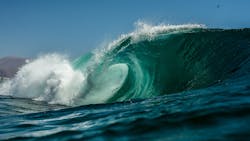WASHINGTON, DC -- The U.S. Department of Energy (DOE) announced the winners of the second stage (DESIGN) of the Waves to Water Prize. Launched in February 2019 by Assistant Secretary Daniel R Simmons, the Waves to Water prize calls on U.S. innovators to leverage the power of the ocean to provide potable drinking water to remote coastal and island communities through wave energy-powered desalination systems. The winners of the DESIGN stage showed they are prepared to build a proof-of-concept prototype of their modular desalination system.
In partnership with the Coastal Studies Institute (CSI), DOE also announced that Jennette’s Pier, located in Nags Head in North Carolina’s Outer Banks, will be the staging ground for the final DRINK Stage of the Waves to Water Prize. During the DRINK stage, contestants will build and test their innovative systems that use only waves as a power source for desalination systems capable of providing clean water in disaster and recovery scenarios, as well as in water-scarce coastal and island locations. The research experience, technical expertise and infrastructure available for deployment and testing make CSI and Jennette’s Pier an optimal location and partnership for the DRINK stage of the Waves to Water prize.
“These competitors and their wave-powered desalination systems could hold a key to coastal community resilience,” said Daniel R Simmons, Assistant Secretary for Energy Efficiency and Renewable Energy. “Their groundbreaking ideas could help us find a sustainable solution to the challenge of water scarcity, in both the wake of disasters and for day-to-day needs in these communities.”
Competitors started in June 2019 with the first, or CONCEPT, stage, where they presented their initial ideas and were judged of their innovation and creativity. Winners of the second or DESIGN stage, announced today, will advance to the next stage, the ADAPT stage. During this stage, teams will continue their computer-based modeling work, tweaking system designs to account for the specific wave conditions at Jennette’s Pier.
Following the ADAPT Stage, competitors will return to the lab for the CREATE Stage, launching in February 2021. Running through September 2021, this stage will challenge contestants to build a functional prototype or proof-of-concept of their system and develop a plan to build and deliver their technology for testing at Jennette’s Pier during the final DRINK Stage, a 5-day, open-water test, scheduled for the spring of 2022.
“CSI brings together multidisciplinary researchers to solve our most urgent coastal challenges, including renewable energy development,” said George Bonner, Director of the North Carolina Renewable Ocean Energy Program at CSI. “We are proud to partner with the U.S. Department of Energy to host tomorrow’s desalination trailblazers here in the Outer Banks.”
CSI is a multi-institutional research and education partnership led by East Carolina University, in collaboration with NC State University, UNC Chapel Hill, UNC Wilmington, and Elizabeth City State University. CSI’s interdisciplinary research focuses on pressing coastal issues, including renewable ocean energy development. For almost a decade, the state-funded North Carolina Renewable Ocean Energy Program, a collaboration between CSI and the colleges of engineering at NC State University, UNC Charlotte, and NCA&T University, have been researching and developing new ways to bring ocean energy technologies to market sustainably, while working with private industry to test devices in the waters off the Outer Banks. CSI operates a renewable energy testing site in partnership with Jennette’s Pier, a North Carolina Aquariums’ operated facility located in Nags Head, North Carolina.
Part of the American-Made Challenges series, the Waves to Water Prize was the first prize announced in DOE’s Water Security Grand Challenge. The challenge is focused on advancing transformational technology and innovation to meet the global need for secure and affordable water.
SOURCE: DOE National Renewable Energy Laboratory



